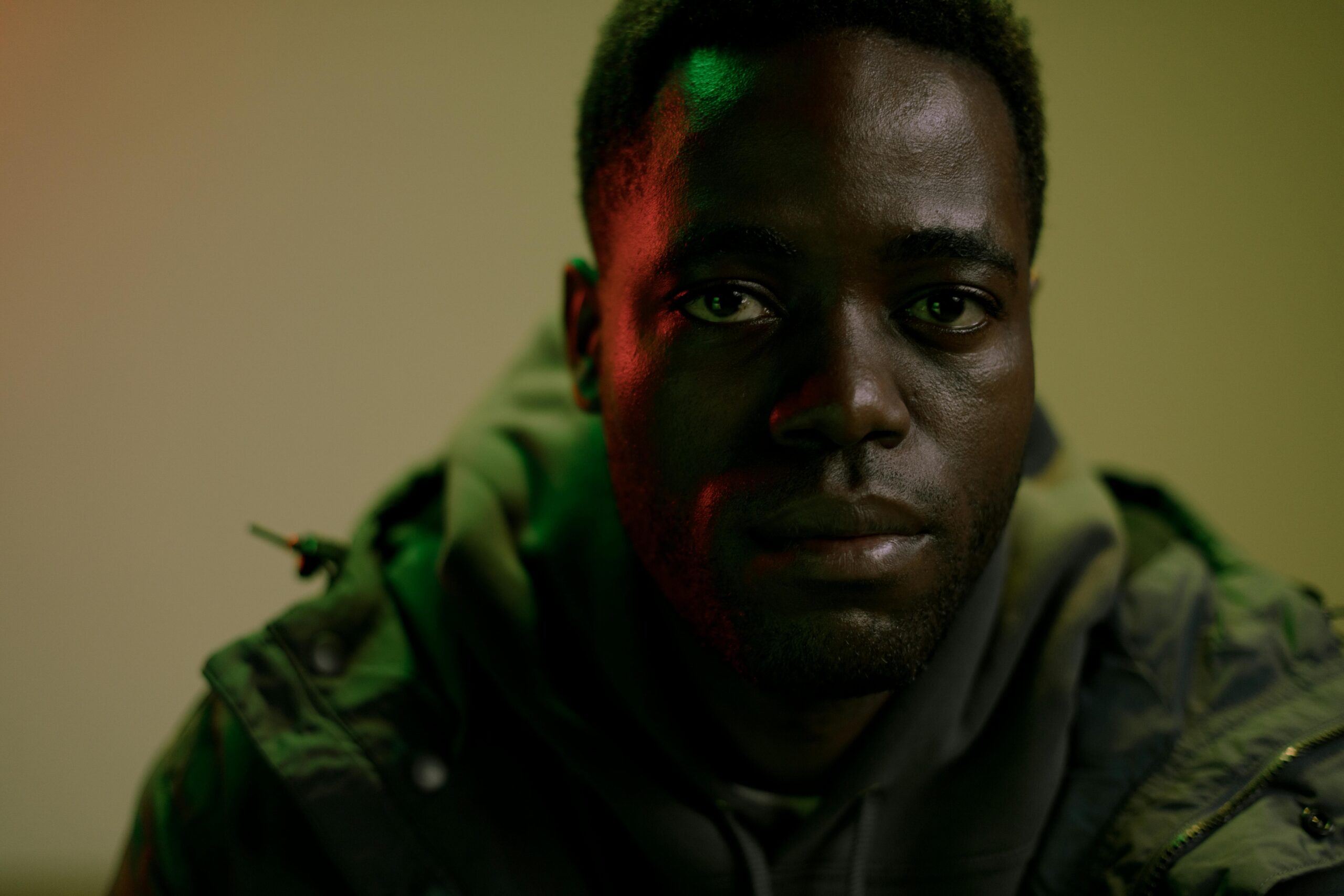Panyin speeds out of his apartment after a call from home. His legs whisk him to the gate of the compound before he realises his feet are naked. After returning to slip on his Crocs, he stumbles into Buttercup Flower Street, willing his mind to be blank. He doesn’t understand why this is his reaction to the call, this sudden desire to walk and walk until he disappears into the night.
The night sky is morose and bald of stars. Panyin ignores everyone’s greetings on the street and hastens out of the untarred streets of Sowutuom to Ankofa Junction. He doesn’t know where he is going, but he has to leave the world where the call he just received exists.
Black Sheriff’s “Kwaku the Traveller” blasts from the speakers in a bar adjacent to the junction. Panyin avoids looking at the yellow storey building by the road, even though he knows his lover no longer lives there. Flashbacks of sweaty sex romps beneath the staircase flood his mind. He wonders what F is doing in Denmark now. They tried to stay in touch, but things couldn’t work out anyway. Soon, F became a distant memory whose pictures on Instagram were a reminder of a life he once had and a bitter mockery of the future he could have had if the world were kinder. In another lifetime, they would have been partners forever. Panyin stops a Lapaz-bound trosky. The rickety bus jerks and burps through potholes, and the man struggles to keep his food down. Everything is swimming towards his throat, emotions he’s tied down for months, even years, and tears threaten to burst out like water from a rock.
“Where are you going?” the mate asks after receiving a 5 cedi note from the young man. For a while, Panyin is dumbfounded. Where is he going? Why did he get on this bus? The mate’s jaws are eerily similar to F’s, and the passenger feels an irrational urge to punch him and scream, “Why did you leave me? You promised we would be together forever, that we could elope to a place where we’ll be free to love!” But sense beckons him back to reality. This is not F. His ex is probably in the arms of a new lover, probably a white man whose genital is a thin slice of raw kneaded dough.
“Lapaz,” he finally says, swallowing the urge to burst into a thousand pieces. A woman behind him taps his shoulder and he turns sharply.
“Are you Kakra or his twin brother, Panyin?” she asks. Panyin shuts his eyes for a split second and his shoulders are about to shake up sobs. He chooses to chuckle and tells the woman that he is Panyin. It’s common for people to get confused about the twins; they enjoyed it as boys, but everything has changed now. Panyin finds it irritating now. Isn’t it obvious that he is the twin with limp wrists and hips that swing slowly when he walks?
He plugs in his airpods and listens to Max Ritcher’s “On the Nature of Daylight”. When the bus stops at the station, he jumps down and walks past the swelling bustle. Hot oil sizzles as a woman drops fresh fish in a pan to fry. The smell of kenkey and hot pepper fills the air and makes his nose sting. Hawkers advertise their wares: fruits, nose masks, water, soft drinks, biscuits, mint, umbrellas, kosua ne meko. On a normal day, he would have stopped to buy a boiled egg garnished with pepper and onion, but today is different. Today, he walks. His legs move on their own accord past the monochrome Las Palmas Restaurant and cross the busy Mallam-Tetteh Quashie Highway. The traffic lights gleam on his photochromic glasses, bouncing off hues that change from green to yellow and then red that reminds him of how his mother bled to death after their father stabbed her five times during a fight. He wonders what his dad does in Nsawam Prison now. He never visited, even when Kakra tried to convince him to go just one time. How could he face the man who changed the trajectory of their lives?
Panyin’s mind is thrashing in a stormy sea, trying to stay afloat. But he keeps walking. If he stops, he will break down. He can’t have a stranger filming his outburst and posting it on social media for engagement. But he wants to stop; he wants to. His legs hurt so much from walking. He’s gone past Lapaz, down Abeka road and is now heading towards North Kaneshie. Vehicles whizz past him, some troskys’ mates calling their destinations: Accra, Circle, Kaneshie. Dust has coated his feet ochre brown but he doesn’t bother to clean them.
A quiet part of him worries he is running mad. He wonders how it began for his colleague at work. Cynthia. Everyone called her his work wife because of how close they were. Then she started showing signs of distress and although he tried to help, she blocked him out. One evening, they said their goodbyes after a long day at work. The next day, her chair beside his desk was empty. Later, he would learn that she suffered a psychotic breakdown that got her admitted to a psych ward at Korle Bu Teaching Hospital. He tried reaching out to her but found out that after she was discharged, she travelled with her mother to Australia. That was where the other half of the family lived. He wonders if this is it, if he has lost contact with one of the only people who made him feel safe and loved.
He ignores the missed calls’ notifications on his phone and plays Keane’s “Somewhere Only We Know” on repeat. When he gets to North Kaneshie, he descends Otublohum Street to North Industrial Area and reminisces about his family. They used to live in that abandoned sea-coloured bungalow on the other side of the street. Now there are weeds growing in the compound. It’s been almost a decade, but everyone thinks the house is cursed after what happened. A family tried moving in when the twins left but the couple was found dead in bed with no apparent cause of their death. Panyin watches the house take on the shadow of the night and thinks about all the happy memories he had growing up in this neighbourhood. He had his first kiss here, with his shy classmate who held his hand under tables. How could a house that held so much laughter be a ghost now?
Finally, he peels himself away from the location. Nobody knows him here anymore. He watches the strangers’ faces, willing them to become his loved ones. But all the people he loves are either dead or outside Ghana now. Everyone is leaving at a fast rate; his colleagues at work seeking employment opportunities in Western countries, his former course mates furthering their studies in universities around the world, church members who come to services with effusive testimonies about acceptance emails and visa approvals, and neighbours who give out their items to him as they prepare to escape the harsh economic downturn in Ghana and move to greener pastures.
He had tried to leave with his twin brother too. Being the academically inclined twin, Panyin wrote the application letters for the three of them: himself, Kakra and his girlfriend, Adwoa. They had applied to numerous universities hoping for positive feedback. Then the rejection emails started pouring in like a deluge. Panyin tried not to get drenched by the disappointment. He was so sure that they would get into the University of Pennsylvania. That had been his main focus during the application process. However, that evening his phone beeped with an email from the university. The rejection made him throw his phone across his bed with a frustrated snarl. He wanted to talk to Kakra who had visited the extended family in Tema when the call came through. Kakra’s excitement made his heart sink.
“Panyin, I got into UPenn! Adwoa also got an acceptance email. We all got in! We did it. Thank God. Oh, God bless you, Panyin for helping us,” Kakra screamed as the other relatives celebrated in the background. Panyin had been so stunned into silence that he could barely mutter congratulations before hanging up and leaving home in a daze.
Somewhere deep down, guilt gnaws at him for his inability to be happy about his brother’s progress. He feels wrong for this, marching into the deep night as though he had just received bad news. What they don’t say about good news is that it might meet you in a terrible place. He wants to mourn his rejection in solitude, but that seems trivial in the face of what is coming. He has never envisioned getting separated from his twin. They’ve been sharing the world in close proximity: a womb, a room, a school, a class. Who will he be when Kakra leaves? Why is life taking the last person he was holding on to in this dreary world? Panyin walks past Melcom and stops to observe the mall, thinking about all the moments he shopped here with his brother or F or Cynthia. He closes his eyes as he remembers the old days of walking down this street with his mother. The memories threaten to crumple his knees like paper, so he hurries away, past Alajo and the fleet of VIP buses parked on either side of the road. His muscles ache terribly now as he crosses the train tracks in Avenor. He wishes to disappear, to become one with the sky that frowns like a scorned wife. He wants to squeeze the moisture out of the dark clouds, feel the water leave the spongy mass and trickle down his arms.
When he gets to Caprice, he turns sharply and stops a taxi without thinking.
“Where are you going?” the driver asks, clutching the steering wheel with a firm grip that reminds him of F’s fingers around his throat. The muscle mass under the grey T-shirt brings whispers of his father to his ears. Those strong hands stroking his baby hair as he fell into the watery depths of sleep. Finally, Panyin begins to cry. Ugly sobs rise from his chest and his shoulders shake as though his body is suffering an earthquake. The driver remains silent and offers him a handkerchief when the young man calms down.
“Bibiaa bɛ yɛ fine,” the driver assures him softly, patting Panyin’s knuckles. “Where are you going?” he asks again after a while. Panyin looks out and sees the Accra Institute of Technology’s edifice in the distance. What would he be without Kakra? He wonders again.
“Tema Community 12 please. I’m going to see my brother,” he says after taking a deep breath.
Rigwell Addison Asiedu
Rigwell Addison Asiedu is a Ghanaian writer. In 2019, he won the Dei Awuku Writer’s Contest, and was longlisted for the African Writers Awards (poetry category) in 2022. Rigwell’s work has appeared or is forthcoming in Lolwe, Isele Magazine, African Writer Magazine, Kalahari Review, Akowdee Magazine, Akpata Magazine, The Muse Journal, Musings Anthology, and KepressNG Anthology. He is an alumnus of the 2024 CANEX Creative Writing Workshop. He is obsessed with water, black cats, and crows.





